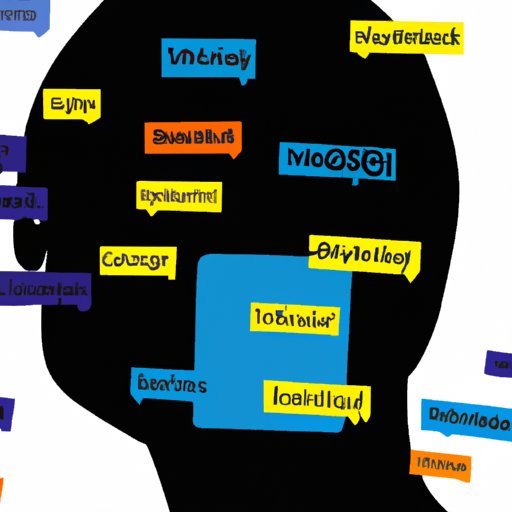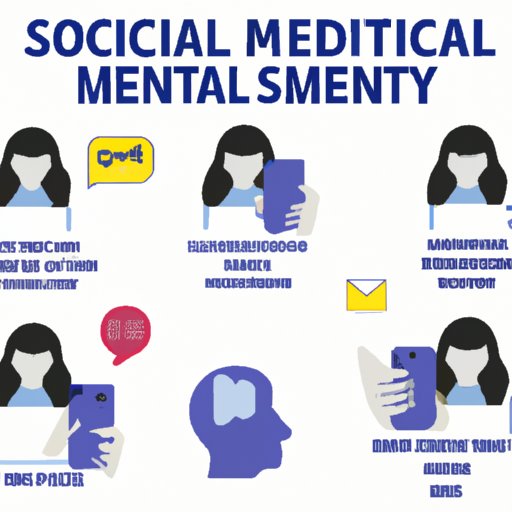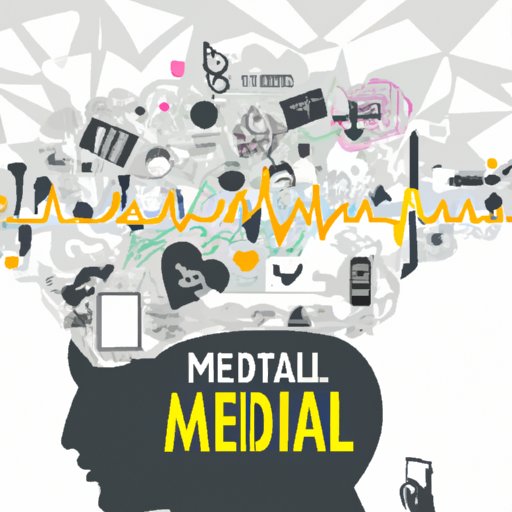Introduction
Social media has become an integral part of everyday life, with users spending an average of 2 hours and 22 minutes per day on social media platforms. But while social media can be a great way to stay connected with friends and family, it can also have a significant impact on mental health.
In this article, we will explore the impact of social media on mental health and examine the link between social media use and mental health issues. We will also discuss strategies to reduce the negative effects of social media on mental health.
Examining the Impact of Social Media on Mental Health
A qualitative study published in the European Journal of Social Psychology examined the influence of social media on mental health. The study found that social media can lead to feelings of loneliness and isolation, increased anxiety, depression, and low self-esteem. It also found that social media use was associated with a reduction in face-to-face interactions, which can further contribute to mental health issues.
Research conducted by the University of Pittsburgh School of Medicine found that people who spend more than two hours per day on social media are twice as likely to experience symptoms of depression as those who spend less time on social media. Furthermore, the study found that people who check their social media accounts most frequently have the highest risk of developing depression.

The Link Between Social Media Use and Mental Health Issues
It is important to understand the relationship between social media use and mental health issues. Research suggests that there is a correlation between the amount of time spent on social media and the occurrence of mental health disorders. A study published in the journal Clinical Psychological Science found that people who use social media excessively are more likely to develop mental health issues such as depression and anxiety.
Furthermore, research conducted by the University of Pennsylvania found that people who engage in social comparison on social media are more likely to experience dissatisfaction with their own lives. This can lead to feelings of depression, anxiety, and low self-esteem.

Solutions to Combat Negative Effects of Social Media on Mental Health
Fortunately, there are strategies that can be implemented to reduce the negative impact of social media on mental health. Developing strategies to reduce social media use can help to lessen the effects of social media on mental health.
Creating boundaries for social media use can also be beneficial. Limiting the amount of time spent on social media and avoiding engaging in activities that may trigger negative emotions can help to reduce the impact of social media on mental health. Additionally, building healthy coping skills such as mindfulness and deep breathing can help to manage stress and anxiety related to social media use.
Conclusion
This article has explored the impact of social media on mental health and examined the link between social media use and mental health issues. It has also discussed strategies to reduce the negative effects of social media on mental health. While social media can be a great way to stay connected with others, it is important to recognize the potential risks associated with excessive social media use. By implementing strategies to reduce social media use and developing healthy coping skills, individuals can help to reduce the impact of social media on mental health.
In conclusion, social media can be both beneficial and detrimental to mental health. It is important to be aware of the potential risks associated with social media use and to take steps to reduce the negative impact of social media on mental health.
(Note: Is this article not meeting your expectations? Do you have knowledge or insights to share? Unlock new opportunities and expand your reach by joining our authors team. Click Registration to join us and share your expertise with our readers.)
